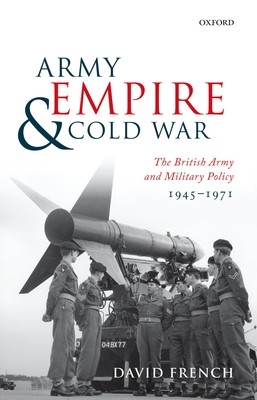
- We will send in 10–14 business days.
- Author: David French
- Publisher: Oxford University Press, USA
- ISBN-10: 0199548234
- ISBN-13: 9780199548231
- Format: 16 x 23.4 x 2.5 cm, kieti viršeliai
- Language: English
- SAVE -10% with code: EXTRA
Reviews
Description
The veterans of the Fourteenth Army who fought in Burma between 1942 and 1945 called themselves 'the forgotten army'. But that appellation could equally well be applied to the whole of the British army after 1945. Histories of Britain's post-war defence policy have usually focused on how and why Britain acquired a nuclear deterrent. David French takes a new look at these policies by placing the army centre-stage. Drawing on archival sources that have hardly been used by historians, he shows how British governments tried to create an army that would enable them to maintain their position as a major world power at a time when their economy struggled to foot the bill. The result was a growing mismatch between the military resources that the government thought it could afford on the one hand, and a long list of overseas commitments, in Europe, Africa, the Middle East, and the Far East, that it was reluctant to surrender. The result was that the British created a Potemkin army, a
force that had an outwardly impressive facade, but that in reality had only very limited war-fighting capabilities.
EXTRA 10 % discount with code: EXTRA
The promotion ends in 21d.18:49:30
The discount code is valid when purchasing from 10 €. Discounts do not stack.
- Author: David French
- Publisher: Oxford University Press, USA
- ISBN-10: 0199548234
- ISBN-13: 9780199548231
- Format: 16 x 23.4 x 2.5 cm, kieti viršeliai
- Language: English English
The veterans of the Fourteenth Army who fought in Burma between 1942 and 1945 called themselves 'the forgotten army'. But that appellation could equally well be applied to the whole of the British army after 1945. Histories of Britain's post-war defence policy have usually focused on how and why Britain acquired a nuclear deterrent. David French takes a new look at these policies by placing the army centre-stage. Drawing on archival sources that have hardly been used by historians, he shows how British governments tried to create an army that would enable them to maintain their position as a major world power at a time when their economy struggled to foot the bill. The result was a growing mismatch between the military resources that the government thought it could afford on the one hand, and a long list of overseas commitments, in Europe, Africa, the Middle East, and the Far East, that it was reluctant to surrender. The result was that the British created a Potemkin army, a
force that had an outwardly impressive facade, but that in reality had only very limited war-fighting capabilities.


Reviews